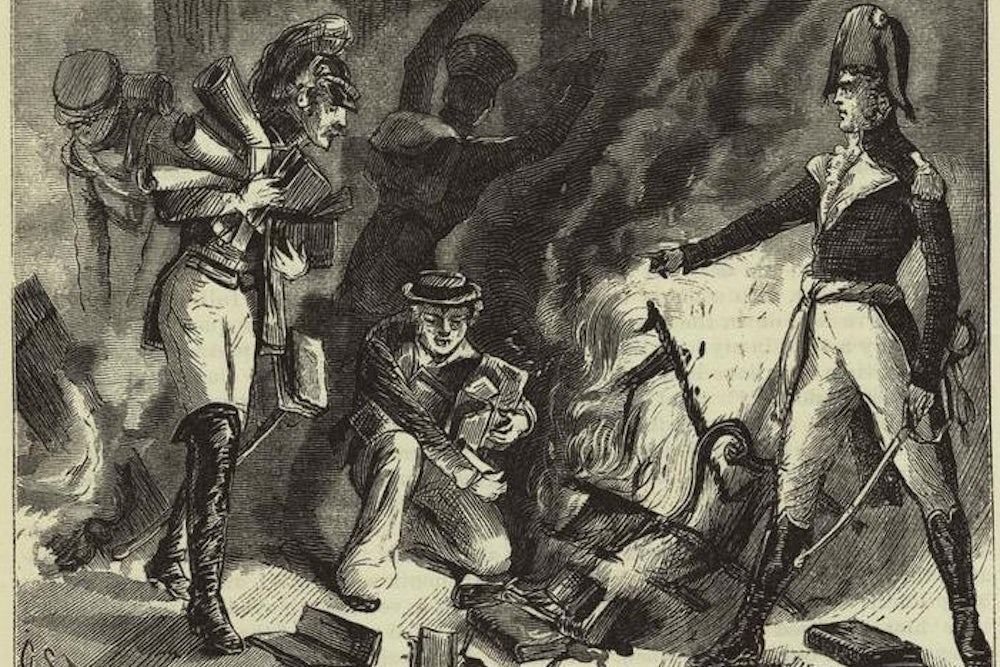The birth conspiracy theories that dogged President Barack Obama were absurd but they had a clear thrust: He was a Kenyan, secret Muslim anti-colonialist (and possibly Marxist). Ted Cruz is now facing his own birther questions because of his actual birth in Calgary, Canada, but the accusations are more nebulous. Earlier this month, Carly Fiorina said, “I find it odd that Senator Ted Cruz did not renounce his duel Canadian citizenship until 2014 when it became clear he was running for president.”
Fiorina’s hazy word “odd” conveys just how uncertain the claims against Cruz are. After all, what is the danger of him being born in Canada, an American ally of long standing? It’s not as frightening or alien to America as many other nations. So it seems implausible to worry that Cruz is a Canchurian candidate raised to take over America on behalf of Canadian interest.
Still, there’s a long history of conspiracy theories about Canada that Cruz’s opponents could draw on if they wanted to raise the specter of a closet Canadian in the White House.
For the first century after the American Revolution of 1776, the United States was a fragile republic that still lived under the shadow of the British empire. Canada was known as British North America. There was a widespread fear that Canada could be used as a launching pad for the English re-conquest of America. The War of 1812—which saw British and Amerindian troops using Canada as a staging ground for an attack that burned down the White House—grew out of these anxieties.
With its large French-Canadian population, Canada was also the home of Catholicism in North America. In that sectarian age, it was easy for fears to arise that Popish plots to subvert American religious liberty were being hatched in French Canada.
As I wrote for Canada’s National Post back in 2000, these fears were given vivid expression when a New York publisher brought out The Awful Disclosures of Maria Monk in 1836. Monk, a young Protestant born in Quebec, claimed she had converted to Catholicism and become a nun. To her horror, she found that nuns were expected to engage in “criminal intercourse with the priests.” The children of the nuns and priests were baptized, then killed. Monk wanted to warn innocent Americans not to trust Catholics, who might bring their barbarian practices to their republic.
Monk was a real person but her sensational story was wholly fabricated—and a huge U.S. best-seller. In retrospect, Monk’s book was a form of Protestant pornography: It allowed the righteous to feel superior to the Catholics, while also enjoying a racy tale.
With the start of the Cold War in 1945, American paranoia turned away from international Catholicism to international Communism. Among the more fervent Cold Warriors, Canada was often seen as a weak link in the battle against Bolshevism. In 1948, the popular magazine Look ran a cover article that asked, “Could the Reds Seize Detroit?” It began ominously: “Detroit, home of mass production, city of assembly lines, maker of weapons in time of war, is the industrial heart of America. Today, a sickle is being sharpened to plunge into that heart.”
Why was Detroit threatened? Because it bordered Canada, “a foreign country,” as Look helpfully explained.
Canadian diplomats and political leaders, with their suspiciously international orientation, were also suspected of being on the side of the reds. In 1986, National Review actually suggested that Prime Minister Lester Pearson was a Soviet spy. Pearson fell under suspicion because he was a friend of E. Herbert Norman, a Canadian diplomat also suspected of being an agent of espionage. There’s also a body of paranoid right-wing thought that suspects that Pearson’s immediate successor as prime minister, Pierre Trudeau, was a communist.
John Kennedy harboured only slightly less deranged suspicions about another Canadian prime minister, John Diefenbaker. Kennedy thought that Diefenbaker was an unreliable ally in the Cold War because Canada occasionally balked at American nuclear policy. In one taped White House conversation, Kennedy can be heard accusing Diefenbaker of being a “liar” and a thief who stole a top-secret memo from the White House.
In the age of globalization, the United Nations has replaced international communism as the new menace. In the 1990s, Canadian businessman Maurice Strong, active in environmental efforts at the U.N., was often fingered as a Canadian subversive. According to William Jasper’s 1992 book Global Tyranny ... Step by Step, Strong was the leader of “a long-standing, organized conspiracy of powerful forces to build, piece by piece, step by step, an omnipotent global government.”
Another scenario for U.N. forces using Canada to destroy the United States was described by Fred Moody in The Seattle Weekly in 1997. According to Moody, there were websites that described a plan to have troops at Fort Drum, New York, to “drive a wedge up along the Quebec-Ontario border until the force reaches the James Bay power complex, where anti-secessionist Cree Indian co-conspirators will help the division destroy the facilities there, blacking out the northeastern United States, which will immediately descend into chaos, crime, and rioting.”
Most recently, the election of Justin Trudeau has inspired a new wave of American paranoia. Using a photo of Trudeau seated at a mosque, Daniel Pipes, a self-styled “Islamism specialist” who writes frequently for National Review and other conservative publications, argued that the Canadian prime minister was Muslim.
Is young #JustinTrudeau a #Muslim? This 2013 BC #mosque photo of him praying suggests so: https://t.co/UPvwgqR5eh pic.twitter.com/rNfKgqXkcm
— Daniel Pipes (@DanielPipes) January 12, 2016Perhaps Pipes’s conspiracy theory could be combined with Cruz’s Canadian birth and other earlier theories to form a grand unified narrative of Canadian nefariousness: Cruz is a covert Canadian spy, raised by Muslims and Catholics, with the intent of taking over America and allowing Cree secessionists to attack.
